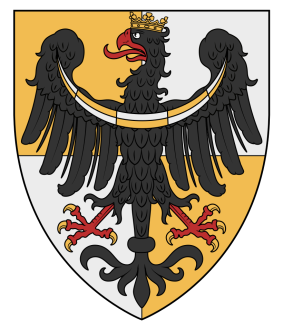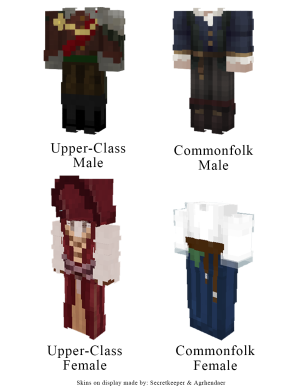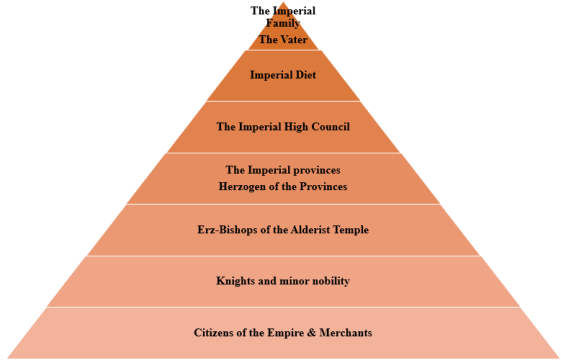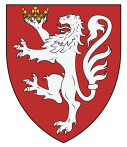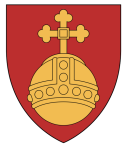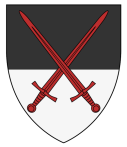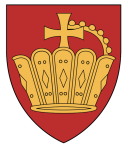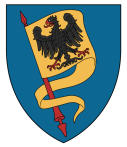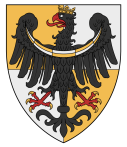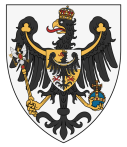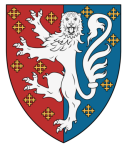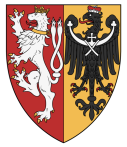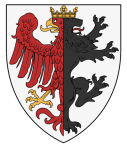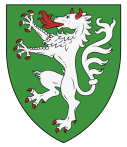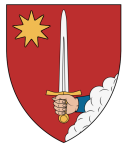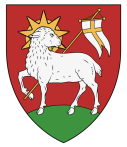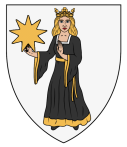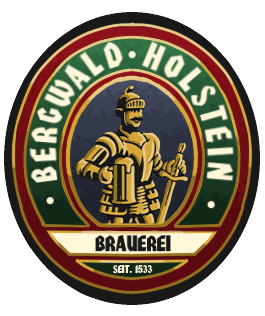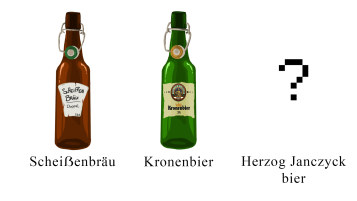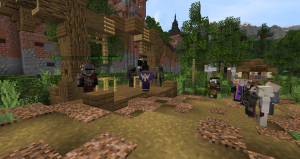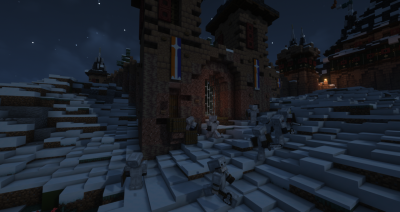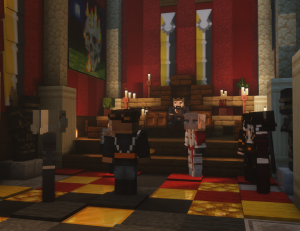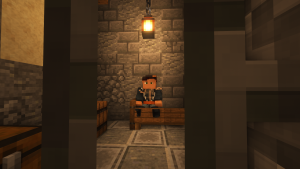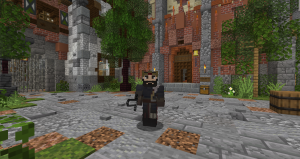The Hadrian Empire
| Capital | Adelsburg |
| Location | The Heartlands, The Hinterlands, |
| Races | Attian Humans |
| Primary Religions | Alderism |
| Political System | Elective Monarchy |
| Current Leader | Kaiser | Diederick-Gobel von Lichtenfelts
Kaiserin | |
| The Imperial Council | ErzCupbearer |
ErzSteward | Reichsmarshall | ErzTreasurer | ErzBannerbearer | |
| Preceded by: | |
Introduction
The Hadrian Empire, often referred to as simply ‘the Empire’, is the far-stretching country west of Eden’s Spine. A land inhabited mainly by the dutiful folk that are the Attian humans, one can see the many fields that cover the landscape being toiled by its hard-working citizens. Its cities are often bustling with life, places where trade, commerce and politics take the main stage. The Hadrian way of life is deeply rooted in tradition and is often relatively simple, mainly because of this the Hadrians are known for their versatility and perseverance through hardship. The civil wars that have plagued the country in the past have left their scars, yet it seems Hadrians always find their way back, dedicating such feats to their deity; Alder. Within the Empire, the political and the martial often go hand in hand, with a large focus on retaining order and stability through military force. Within the Empire, it is not uncommon to see commoners rise through the ranks, oftentimes talented men and women are recognised and get the chance to prove themselves useful to their nation in places such as the army or civil offices. A land full of chance, and one of recognition, with its Kaiser at the helm.
Culture and Society
Apparel
Upper-class citizens & nobles
Citizens of the Hadrian empire are an incredibly diverse people which also translates to their apparel. Those living in the capital prefer a more aristocratic outlook. The men of higher standing dress in formal robes and suits decorated with imperial medals they earned throughout their careers. Often this goes paired with leather boots created by the finest shoemakers in Adelsburg, or imported from Anjyarr. However, this is a phenomenon mostly seen among trader families due to their access to merchant ships that cross the Al'Hadar Deep. Those from military families often wear decorative bits and pieces of armor over their outfits to represent their family careers. The cloaks, suits, and robes of upper-class citizens come in a plethora of colors, though most choose to represent their house by wearing house colors primarily in some way. To top it all off, upper-class men like to wear impressive headdresses decorated with large dyed peacock feathers.
The women of the capital region, The Grand Principality of Brandenhafen, follow the trends set by currently popular designers that work for the tailor’s guild in Adelsburg. They do not necessarily follow the “house color” standard set by the men and are often much more colorful, combining local, house, and exotic colors only made possible by the import of dyes and silks from the south. These marvelous dresses go paired with the trend of long and flowing hair and golden jewelry often in the shape of Nine-pointed-star necklaces and rings decorated with popular gems such as Citrine, Amethyst, and Ruby.
Those of higher standing from the provinces are a lot less colorful, often sticking to the house color standard or in the case of richer families, import expensive coats and dresses from the capital region or in the case of merchant families, from the southern regions that create many of the expensive fabrics used in the clothing of rich imperials.
Commonfolks
The average imperial citizen is far from as colorful as the upper class. Usually resorting to brown, red, and green-tinted fabrics as those are the easiest to obtain in Imperial lands. In many cases, citizens of the empire wear their available clothes in all kinds of interesting and in some cases comical combinations, for example, wearing a soldier’s shirt and trousers obtained during service in the imperial army combined with a large leather coat and a simple hat decorated with a feather found fallen off a noble’s hat. Imperial citizens are extremely resourceful people and despite their lack of access to expensive and colorful fabrics do their very best to look as good as they can, often trying to imitate the looks of nobles with what little resources they have. This is all to increase their chances in the tight job market in the Imperial Capital region. Those who are or have been in the army often use parts of their uniform to increase the appeal of their outfits and make sure people see them as veterans. Commoners too are fond of impressive headdresses, though men are seen wearing them more often than women. They’re usually modified soldier’s or sailer’s hats decorated with pins and feathers they find.
Outliers
As stated, the Hadrian Empire is an incredibly diverse people with their own cultures and customs. People from all over the continent travel to the imperial provinces to make it their home and taste a piece of the riches it has to offer. Though these migrants are not always welcomed with open arms. They stand out like no other in the Imperial Lands as they care not for imperial fashion or beauty standards. Examples of these people would be the Halflings or Denur, who mainly settled in the Bergwald province. Halflings tend to wear farmer’s rugs and suits made by local halfling tailors, mostly being a colorful patchwork of different styles and costumes. Naturally, this is the result of Halflings being unable to actually fit human-made clothes, and many imperial tailors being unwilling to provide for the small Halfling minority. The Denur on the other hand, stubborn as they are, only wear clothes imported from the Denur holds of the north and east, despite them being imperial citizens they look like and are often mistaken for travelers from the Denur holds. The Denur are a proud race and citizenship in the empire doesn’t mean they have forgotten their heritage and culture. Because of this little demand for imperial outfits for the Denur the Halfling’s problem with low demand for small sizes only accelerated, encouraging the development of their own fashion.
Another noteworthy outlier is the Imperial Tiefling. They do not mind the imperial clothes and fit them just fine, though the Tiefling populous tend to cast any sort of logic for imperials when creating an outfit aside, instead of following the house color standards and latest fashion trends, the Tieflings tend to wear their combinations based on how they are feeling at the time or what they are trying to represent, similar to the skin painting custom they inherited from their ancestral home of Nous.
Social Hierarchy
The Hadrian Empire as being the most populous human nation on the continent of Eden has developed a complex social hierarchy kept together with an overwhelming bureaucratic system to keep the wheels turning. From the imperial lawmakers to the simple workers on the field receiving their tax slips once again, everyone feels the cranking gears of the imperial social machine. This monstrous construction is the result of the lawmakers of the Imperial Capital, Adelsburg, constantly simply writing new laws and decrees on top of the existing system, ever-expanding the size of the state and its complexity. Any attempt to unwind this system and rework it from the ground up is often met with sabotage from the established order, not in an attempt to sabotage the state itself, naturally, but to preserve the personal power and influence this web of laws and decrees have built for those saboteurs and their families. Though through all this complexity and constantly expanding states there is a simple way to explain this imperial machine and its inner workings and hierarchy.
The Imperial Family
The Hadrian Empire’s Imperial family consists of those chosen by the Imperial Diet to rule the Empire. Only Herzogen of the recognized duchies of Hertzland, Veronia, Bergwalts, and Hölzland together with the family ruling over the crownlands, the principality of Brandenhafen, can be chosen for the role of the emperor after the sitting one dies or decides to abdicate. There is no such thing as a set imperial dynasty and every Herzog can one day grow to become the Emperor and move with their household to the capital of Adelsburg. The Emperor, or Kaiser in the Attian dialect, and his family hold immense power over the imperial diet and lawmakers of the Empire for it is the Emperor alone who can assign lawmakers to the High Imperial Council. Within the diet itself, the Kaiser holds a ceremonious three votes, yet the emperor can choose to veto any decision within this parliament. Today, the Empire is ruled by Kaiser Diederick-Gobel von Lichtenfelts who reigns from his court in Adelsburg.
The Vater
The head of the Alderist Temple is known as the Vater, translating to the Father of the Alderists. He is the sole chosen leader of the faith within the Empire and therefore holds immense power within the Empire despite not being as involved in Imperial politics outside the diet, where he holds three votes in the name of the temple. Yet one could easily argue that the political power of the Vater is much greater than the three votes he has to his name as he can choose and place two other Erzbishops in the Grand Duchies of the Empire, that being Hertzland and Veronia. These Erzbishops too hold a singular vote in the Diet, bringing the total power of the Temple to five votes. This power was obtained through the position the temple managed to place itself in throughout the years, for they are the sole representatives of the founder of the Empire, Alder himself, and by acting as a bastion of faith and hope for the Imperial citizens have they slowly but surely grown to a massive institution that can be found in many forms throughout the Empire. Be it in the temples as preachers, be it as a cultist of Mortius at a local funeral, or as battle wizards on the battlefield. The temple’s servants are everywhere and the Vater is the undisputed leader of it all.
The Imperial Diet
The primary decision-making body of the Empire is the Imperial Diet, it is a council of all the Herzogen of the imperial provinces and heads of faith. Each representative within the Diet holds a certain number of votes which they can use to shape the future of the Empire. The diet itself is completely inaccessible for regular citizens and lower nobility, only the electors and their servants are allowed within the halls of the diet in Adelsburg. It is here where laws are proposed and accepted before being sent to the imperial councils throughout the empire. There are only two pathways for any individual toward getting a seat within the diet, those are climbing the hierarchical ladder of the Temple of Alder, becoming either an Erzbishop or the Vater, or climbing the political ladder, becoming the head of a great house that rules over an imperial Duchy or the grand principality of Brandenhafen.
The High Imperial Council
This council is the product of emperor Diederick-Gobel von Lichtenfelts and consists of five high council seats. Each of these positions acts as an extension of the emperor and often takes action in his name. To become a council member, one has to be noticed by the ruling emperor for it is only he who may choose the council members for the duration of his reign. People from all walks of life could on paper become part of this council, yet it is extremely rare to see someone from outside the emperor’s inner circle on one of these seats. Imperial council members are held in high regard but have in actuality very limited political power outside their designated roles. They do not hold voting rights in the Diet and can be dismissed without pardon by the emperor.
The Imperial Provinces
When leaving the imperial capital, Adelsburg, and its direct surroundings, one crossing through the empire will soon find themselves in one of the imperial provinces. These semi-independent city-states held much of the local power, only answering the Hadrian Imperial Court, The Diet, and the Emperor to whom they swore allegiance. The provinces of the empire do not have a standardized way of government, often that is decided by the ruling Herzog or Herzogin and their council. The provinces hold the right to create their own local laws and punish criminals according to them, only being able to be overruled by the Imperial Court or an edict from the emperor himself.
The style of government varies a lot between provinces, while the grand principality of Brandenhafen, due to it being the Imperial seats are firmly autocratic, the now diminished Hinterlander provinces of the east traditionally held more democratic views, even declaring themselves a republic instead of a kingdom during the second Hadrian Civil war when the nation broke apart. Due to these vastly different styles of local governments, the lives of citizens can be greatly affected by who sits on the Herzog’s seat at the time. Though despite that, citizens tend to remain in their ancestral homeland, even if the conditions are far better in the neighboring provinces. This mostly is the result of a stubborn form of pride and patriotism for the imperial province the citizens reside in.
The initial borders of the imperial provinces were originally determined back in the day of the first Hadrian kings after the Attian Migration south. They were drafted along natural features and ethnic lines between Hinterlander natives and Attian settlers. Though throughout the centuries, internal squabbles, wars, coups, and destruction of entire dynasties since the days of the plague have drastically changed the original layout of the imperial provinces to what the people are more familiar with in this day and age. A great number of ancient bloodlines and their states have either been altered in shape and size or are outright forgotten and disappeared from history.
Being a Herzog of an imperial province is a very prestigious position as they are all technically next in line to become the Emperor. Once the sitting emperor either abdicates or dies, the Herzogen of all the states are called to the capital to vote amongst themselves for a new emperor.
Erz-Bishops of the Alderist Temple
Within the imperial provinces exist many extensions of the Alderist temple whose primary seat of power is in the capital of Adelsburg. Among the highest of these pious men and women are the Erz-Bishops, these wearing the cloaks of the Erzbishop are local religious leaders appointed by the Vater himself. The Bishops hold little in terms of political power outside a vote in the Diet, yet they are considered the pillars of the provinces by local citizens and are responsible for upholding Alder’s order and uprooting any form of heresy when it is found by any means. They have strong ties with the local cults of Mortius, working together with them to safeguard the plains of Mortius and using the martial prowess of Mortius’ followers to brutally assault voidal cultist’s headquarters and execute religious troublemakers.
Knights and Minor Nobility
Serving the Herzogen of the imperial provinces are various minor nobles and knightly orders. These are in most cases a circle of upper-class citizens and landowners who hold various local titles. The local knightly orders often act as the core of the provincial military forces, mostly swearing allegiance to their local Herzog and only following his commands. These peoples hold little national power, yet through their martial prestige and influence on a local level, lots of citizens aspire to one day grow to one of these positions as a first step towards Herzogdom.
Noteworthy Knightly Orders:
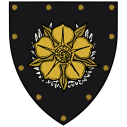
|
The Order of the Golden Rose
Founded during the exile of Diederick-Göbel von Lichtenfelts while being hosted by the House of Tzyrnowski in Lünburg, the Order of the Golden Rose recruits only from among the most promising candidates of the Attian populace. Those initiated into the Order vow to not attempt to further their own ambitions through their position, but toil endlessly to improve the lives of His Imperial Majesty's citizenry. To symbolize the fundamental ideals of loyalty and brotherhood, all members of the Order of the Golden Rose have vowed to stay loyal first, last, and always to the rightful Kaiser. Their purpose is to root out all that is considered dishonorable, disloyal, and evil, while in service to a worthy Kaiser. To be a Golden Rose Ritter is to become a beacon of hope to the populace, and through their efforts create a better version of Eden.
|
|---|
Citizens of the Empire & Merchants
At the very bottom of the social ladder dwell the hordes of ordinary citizens that fill the cities and towns of the Empire. Craftsmen, Fishers, Farmers, Merchants, and blacksmiths all belong to this caste of commoners. They fill the ordinary roles within the Empire. The citizenry is the most numerous caste and forms the backbone on which the great imperial machine stands. In times of war or voidal incursions, many ordinary citizens are called up for military service to protect their homeland. Most citizens live a poor man’s life and have to provide for themselves on a day-to-day basis as there is no imperial system to protect them from the poor conditions they often find themselves in.
Political Beliefs
History and Overview
Against the general expectations of many, the Hadrian Empire is not a unified nation ruled by a powerful central government, but it is actually a big confederation of city-states and knightly holdings. The most prominent of these, the Grand Duchies and the Principality of Brandenhafen make up the closest thing to an Imperial central government called the Imperial Diet through their rulers. The Members of the Duma are a collection of prominent Imperial Nobles and clergymen who together vote on the direction of the empire and a new emperor if he happens to die or abdicate. The Imperial Provinces are tied together in this confederation through a common faith, culture, and belief that they will be overrun by the powers of the voidal plane on their own. During the days of the early Hadrian Empire, Kaiser Philipp II von Lichtenfelts reformed the political system of the empire towards a more centralized government and introduced the Hadrian Duma which was essentially a citizen ran governmental body that had authority over the entire Empire, to the great dislike of the Herzogen who were fiercely in favour of more regional autonomy. Especially the noble house of Tzyrnowski from the northern province of Flüssland was fiercely critical of the Duma. This eventually led to a short-lived coup attempt from Herzog Janczyck Marius Tzyrnowski in an attempt to take over and steer the empire in a different direction. The coup failed and the Duma lived on for a few more years.
The Hadrian Duma was eventually replaced with an imperial council introduced by a successful usurper by the name of Sine Verrador. After Sine overthrew the Kaiser during the Hadrian-Raevendrecht War of 1530, he vowed to reform the empire and its political system to fight the tyranny the empire was under during the rule of the Kaisers. Though ambitious, the new Imperium was relatively successful for a few months until rumors were heard of the brother of Kaiser Philipp, Diederick, was forming an army in the break-away province of Flüssland to retake the empire from the usurpers. Diederick’s campaign was successful and the usurpers were driven out. After the empire was restored under the Lichtenfelts dynasty, Diederick restored the original Imperial Diet system from the early days of the empire.
The Imperial Diet
The Imperial Diet consists of a total of nine seats with each a set number of votes to their name. The diet acts more or less as an imperial forum where nobles and clergymen from all over the empire come together to negotiate and compromise on imperial law, the division of imperial lands, and choosing the next emperor in the scenario of the sitting one dying. The Imperial Diet’s votes are split among the high nobility and clergymen. Where grand duchies and principalities enjoy the privilege of having multiple votes due to their size, influence, and population, the smaller duchies only have a singular vote. The Alderist temple and her branches have a total of five votes split among them. The right to vote essentially rests on territorial entitlement and clerical power. When a new Herzog, Erzbishop, or Vater is chosen, they automatically inherit the voting rights of their predecessor.
| The Imperial Family *
3 votes |
Herzog of Brandenhafen
2 votes |
Herzog of Hertzland
2 votes |
Herzog of Veronia
2 votes |
Herzog of Bergwaltz
1 vote |
Herzog of Hölzland
1 vote |
Vater of the Alderist Temple
3 votes |
Erzbishop of Veronia
1 vote |
Erzbishop of Norbüren
1 vote |
* The sitting Imperial family only holds a singular ceremonial/advisory vote in case of elections for a new emperor.
Economy
The Hadrian Empire ever since it was re-established after Sine’s coup has been a divided political body made up of a number of duchies, lordships, freestates, and a principality in its center. Economic prosperity throughout the empire is measured as a collective of all the local economies within these smaller substates. The Hadrian economy is often described as the largest in the west and is often described to be achieved through collaboration and healthy competition between the duchies. One defining factor of the Hadrian economy ever since the foundation of the kingdom has been its location on the crossroad of the civilised world. Merchants and craftsmen from all over the continent gather together in the Hadrian towns and cities to sell their wares and establish permanent trade routes. These trade routes are vital to the empire and due to this intimate understanding of this by the government, the trade routes are described as relatively safe to travel compared to the more remote alternative routes through the deserts of Anjyarr or the old Magna Attia, routes that are often the victim of marauding orc or undead armies that raid and pillage every caravan they can get their hands upon. Besides these lucrative trading endavours, the Empire heavily relies on its steady peasant driven economy.
Peasants and rural life
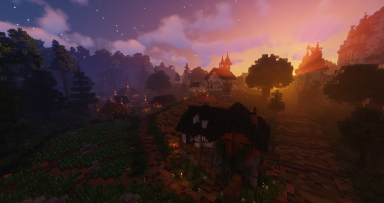
The peasantry makes up the bulk of the Hadrian so called “excess population”. They reside in the villages and towns surrounding the big cities where they are bound by service to permanently work for their landlords in exchange for safety and housing. Most peasants either work on the fields or in the rich steel mines of the spine branch that stretches across the northern border of the empire. Those working on the fields mostly reside in the Bergwald and Hertzland regions where the land is the most fertile. There they spend their days growing excessive amounts of wheat, potatoes, carrots, and other simple vegetables to feed the ever hungering mouths of the empire. Besides fieldwork, farming peasants handle the cattle and through that the meat production too. Cows, chickens, pigs, and sheep are the most prominent local domesticated animals available to these peasants, the meat and wool produced by these big animal farms would mostly be exported to the larger cities to be further produced into other products. Most of these peasant communities operated completely on their own as long as the goods were paid for and taxes kept flowing to the ruling nobility. The noblemen handled external relationships and politics for the villages under their control, and were not typically involved in daily activities or decisions.
Those working in the mines often lived within communes close to the major towns created besides the mines themselves and only make the long trip back home to their villages when they have short periods of time off. Most of the Empire’s mining produce comes from the mines dug into the spine of Eden in the Bergwaltz and Hetzland regions where the coal and iron deposits are at its largest. The resources extracted from these mines are transported to the steel producers in the crownlands and prepared for either export or internal sales. The Hadrian Coal and Steel production has become such an effective industry that as of the year 1535, it is considered the biggest on the continent, kicking the Elves of Luminion off the number one spot.
Import:
The Empire has grown to become a mostly economically independent nation regarding the basics such as food, clothing, and raw materials. This has allowed to Hadrian economy and population to rapidly expand. Yet as the Empire grew, so did the need of its citizens, especially those of what is considered the upper-class who can no longer be satisfied with simple wool cloth and unseasoned meat. This growing need for luxury goods has made the empire one of the world’s major importers of all kinds of high quality luxury products from all over the continent. Some of the largest imports include:
- Kahve, spices & gold from Anjyarr - 41 tons a year
- Dark Steel from Avalheim and Luminion - 20 tons a year
- Gemstones from The High Kingdom of Arduan 16 tons a year
- Hardwood furniture from Luminion & Mitrona - 15 tons a year
- Special Weaponry from Luminion & Arduan - 5 tons a year
- Silk, paint, and fruit from Anjyarr - 5 tons a year
Export:
The Empire relies heavily on luxury import and its strong internal economy to fund those trades. Though even as the Empire does not bathe in much in terms of luxury items, it excels the production of in bulk produced raw materials and crops. This huge excess is traded off to nations around the continent who lack the capacity to produce enough of these basic materials. Some of the biggest trades include:
- Refined steel to Raevendrecht - Drastically reduced exports since the war
- Salted meats and grain to Anjyarr, Avalheim and Arduan - 80 tons a year
- Alcoholic products, globally - 30 tons a year
- Alchemical products, globally - 20 tons a year
- Books, candles, and ink, globally - 10 tons a year
Alcohol
One of the driving and prominently growing exports of the Empire is that of its locally produced alcoholic products. Beers and Ales produced by the renowned Bergwald-Holstein brewing company has slowly been taking over the world. Triumphs such as “Kronenbier” and “Scheiẞenbräu” are considered both local and growing global hit products. The company’s Patron, Friederich von Bergwald-Holstein has quickly grown to become a successful merchant that wishes to honour the legacy of the legendary brewmaster, Boris Krüger.
Celebrations and Holidays
- Day of the Squire
The Day of the Squire serves as a way for any willing Attian to prove themselves worthy of being Squire to a Knight by going through a series of tests and challenges. Local farmhands, workers, serfs, and all other citizens can participate freely in the trials. A chosen jury of Knights will accompany the Kaiser and will judge the trials, deciding who may proceed through the rounds. The winner of the Day of the Squire is granted a hand-written recommendation from the Kaiser himself to bring to a Knight of their choice, in an attempt to serve them as their Squire. The Kaiser also grants them a so-called ‘Golden Griffin’, which is a coin that serves as memorabilia and as proof of authenticity. Each rendition of the event offers its own new set of challenges and trials, ranging from jousts to melees or battles of wit, as all aspects that make a Knight must be put to the test.
- The Gryphite Victory Tourney
Once every four years, a tournament is held at the Imperial capital, Adelsburg. At this renowned tourney, people from all over the continent are invited to witness the various knights and soldiers of the Hadrian realm compete for honour and glory in their most prestigious armours decorated with colourful clothes and large plumes. The tourney’s content is vaguely based on the events of the heroic victory achieved at the battle of the Heartland pass. Here knights of the Order of the Griffin hold a parade through the streets of the capital followed by their personal retinues, bearing the banners of their houses. After this show, all attendants gather at the tourney ground where they will simulate great duels from the battle. These go paired with jousts, archery contests and single combat duels between the lower Knights. The tourney is intensely followed by people all around the world, and bards usually take much inspiration from its happenings for their songs and tales.*Festival of the Ashes Originating from the day the Attians founded the first Kingdom of Hadriana after the great collapse of the Attian Empire, followed by the journey south led by Kaiser Onnodrith. On this day, the Empire celebrates by dressing up in the old garments and cultural styles of their ancestors. The Attians do this as a way to remember the olden days before the downfall. Here they play songs, dance, and feast in the capital for the entire day. Certain people who are often referred to as street actors and jesters, wear monstrous masks to play the role of terrors and demonic beings. These actors try to emulate the happenings of that fated day, as the festival doubles as a day of remembrance as well as celebration
- Krügerfest
It is a tradition within Attian societies to celebrate when the first leaves drop from the trees, which they call Krügerfest. During the day and the following night, all public drinking laws in Attian settlements are lifted, and people celebrate in unison all through the streets. It is customary that drinking competitions are held, eventually crowning someone ‘King Krüger’ for the night. The holiday originates from the tale that a man bearing the name Krüger visited a northern village on the first day of the Amber Dawn, dragging a cart filled with ale, mead and whiskey. The villagers drank deep into the night as the celebrations carried on, this northern tale has now been accepted as fact by most of the Attian population and is celebrated every year.
- Geistertag
Geistertag, commonly known as the ‘Day of the Dead’, is a special day on every Attian’s calendar, for it is the day the Eseron and Lilith cross one another. There have even been sightings of Lilith itself, clear in the night sky on this day. Lilith’s influence over the mortal realm is believed to be at its highest point, which has many unforeseen consequences. Attians believe that if you were to step outside during this day, deceased relatives would come back from the dead to get a hold of their potential host. Every year, unforeseen disappearances are reported to happen commonly on this night in particular, fueling the legend of this day. A common countermeasure against these spirits used by the Attian populace is to surround one’s house with carved pumpkins and keep all doors and windows tightly shut. If one were to possess any portraits or paintings which depict a deceased relative, all of them must be turned around so that they cannot be seen, seeing as they are witnessed as portals the entities from Lilith use. After the conclusion of this night, all of the Attians come together in their respective communities for a shared breakfast, along with a ritual pumpkin burning to rid the last of the spirits, sending them back to the realm of the dead.
- Hexensnacht
The Hexensnacht is the celebration of the commencement of the new year in Eden, this night is usually filled with drinking and eating the signature dish of the evening: the Oliebal, a ball of fried dough with raisins imported from Anjyarr. For the occasion, special balls of coloured powder are produced that can be mounted on arrows. Attians shoot these balls into the night sky, watching them explode into a colourful explosion which lights up the grim winter night. These celebrations go all through the night, as the Attians believe anyone that sleeps shall be tortured by terrible nightmares depicting their own demise, or that of their loved ones.
Religious Beliefs
Alderism
The primary, and official state religion of the Hadrian Empire is Alderism. As the name suggests, the religion revolves around the figure named “Alder” or “Alder Himmelschwert”. A mortal made God through his understanding of the Greater Pre-Determination. An order of the universe that suggests that all that is, was, and ever will be is pre-determined. Yet there is a duality in this prophecy for where there is light, there also must exist darkness. These are the two pre-determined paths of the Order of the Greater Pre-Determination. Alder was the first mortal to be enlightened by the path of the light and used this knowledge granted to him to guide his people, the Attian Humans of the North to greater heights, for when one can be shown the path that will lead to glory and success, it is a given that it should be followed. Alder was an inspiring figure that through years of preaching and gathering support rose through the ranks of Attian society and eventually became their guiding shepherd.
Yet not all was bright for Alder was without an heir, and when he died, his ideological children, the Attian people, were without the guidance of the Greater Pre-Determination. Alder knew this and through his faith, he was able to in a desperate move, preserve his essence by shrugging off shards of his soul and creating nine beings that each represent a piece of his enlightened form that contained knowledge of the Greater Pre-Determination. These nine beings, the nine points of Alder’s star, are the Sentinels. Angelic beings that though fragmented, each represent aspects of Alder’s guidance. Bishops and the Vater, who represents a sort of reincarnated Alder, work tirelessly to decipher the visions given by the sentinels, combined with the legends and scriptures of Alder, to reforge the path to his guidance and through that, Enlightenment in the afterlife.
This ideological quest, though noble, is plagued by the same duality that represents Alder’s Sentinels and the Greater Pre-Determination, for we as mortals possess the cardinal flaw that is free will. A gift given to us for existing in the exact middle of the duality of the Greater Pre-Determination. A purgatory where our souls are doomed to forever wander on the thread of Enlightenment of damnation. A hellscape where we are nothing but prey for false Gods and Manifestations of Damnation to drag us into a deathless life in eternal slavery service of these Demons. Yet, the free will we are granted can also be a blessing, for we can only fall to this eternal damnation if we allow ourselves to do so. By following Alder’s guidance we can stay clear of damnation and allow our souls to move on towards the great halls of Alder after passing. There are two Pre-determined paths, and it is up to us mortals to choose which one we wish to wander on.
The Nine Fragments of Alder, the Sentinels:
- Rosatia | Sentinel of Wisdom and acquiring knowledge
- Salvor | Sentinel of War and Honour
- Elric | Sentinel of Judgement and Justice
- Alda | Sentinel of Love and Beauty
- Aristea | Sentinel of Fertility and Decay
- Reimar | Sentinel of Creation and Craftsmanship
- Volker | Sentinel of Change and Destiny
- Mortius | Sentinel of Death and Dreams
- Dolus | Sentinel of Deceit and Corruption
Military
Chivalry and Knighthood play a significant role in the nations' culture. Knights are those who have proven themselves to the King and have been given high status and the honor to serve under the King and nobility. Every knight must wear their households' colors or crest on them to represent their family. Nobility are those who have the high authority right under royalty. They possess more privilege than any other social class below them in Hadriana.
Structure of the Hadrian army
Knights of Hadriana
With the collapse of the Attian Empire and the subsiding Rotting Plague, the number of men needed to wield an army steadily declined. Hence the early kings of Hadriana relied on a professional core of riders, ditching their familiarity with foot-infantry. These riders required professional training from a very young age. Thus the concept of this riding elite quickly became hereditary, so riders would teach their children from a very young age to wield a sword and ride a horse. To keep this army loyal, the early Kings of Hadriana would give them special hereditary privileges as long as they swore the Oath of Fealty to the King. The families of these so-called knights would forever be anointed with these privileges. They have a special standing in Hadrian society and have the responsibility to administer provinces or fiefs. To be a Knight, however, is no easy feat; the course of Knighthood will start with rigorous training and exercise. Next to that, they learn the ways of court and manners. Follow up by the ways of the sword and shield. A knight is tasked with having the skills of many different weapons. A knight also needs to show an excellent set of skills for handling animals and horse riding. Hence, every knight cares for their horse.
Man-At-Arms
Man-At-Arms are the backbone of Hadriana. They are the shield of the nation, the core of the army, and the last ones to falter. Man-At-Arms serve and protect the citizens and Hadriana as a nation. Man-At-Arms are often conscripts; people who wish to serve the King can sign themselves up for training. Man-At-Arms will be put under a Hadrian Knight, who will act as their superior. They will wear the colors of said knight by painting it on their armor, shield, or wear fitted clothing. This turns entire armies into endless parades of colors. A Man-At-Arms will follow a rough training period of drills, combat skills, and the handling of weapons and armor to mold them into the perfect soldier.
Chaplains
Chaplains, or commonly named Paladins, are the warrior-priests of the clergy. They minister the spiritual and psychological well-being of every knight, Man-At-Arms, or other that holds the steel to defend Hadriana. Yet, they are well known for their use of magic in combat. This is due to the clergys' laws around magic itself.
They instill the values and beliefs of the Maker and the Sentinels to promote veneration in the ranks. They are leading from the front as awe-inspiring Paladins, fighting wherever the foe is most fierce. Their training is a combination of standard Man-At-Arms training, combined with the church's spiritual, magical, and strict religious guidance. They could lead entire armies if needed, praising the Maker while rejoicing in the glorious act of war. They go to ever more marvelous deeds of bravery, devotion and chivalry—most of them devoting their lives towards one of the Sentinels.
Laws and Judicial System
The Hadrian law
Base Fundamentals
Law article I. Thou shall not inflict acts of barbarism, violence, or other of the kind to those fellow citizens.
Law article II. Thou shall not steal from others in the name of self-lust or greed.
Law article III. Thou shall not inflict destruction on other properties not owned by thou self.
Law article IV. Thou shall always stay faithful to the Maker, never to follow false idols or gods.
Law article V. Citizens shall not tolerate individual conversion or public praisings to false idols or gods.
Law article VI. Thou shall not kill nor harm an individual.
Law article VII. Citizens shall not tolerate any individual who denies the path of Alderism or His will.
Law article VIII. Thou shall never deceive those of goodwill or cheat in marriage.
Law article IX. Thou shall not take the word of the Alder and his Sentinels in vain.
Law article X. Thou shall not use magic for wrongdoing or without jurisdiction of the clergy.
Punishment:
Punishments given to those who break the law are strict and sometimes brutal. Those speaking against the law can receive punishment, as the givers of judgment are the law. And those speaking against it are against the law itself.
In most cases, they are looked over by a judge. The judge can either be someone of nobility or a priest of the clergy. In rare cases, the king himself can perform the role of judge.
Depending on the breaking of a law, punishments are always performed in public. Thieves lose fingers or an entire hand, for example, beggars and liars an ear, and those who commit acts of heresy are either tortured or sentenced to death by fire in the worst case.
An executioner or knight always performs sentences of death. The church looks over all public performance punishments that are linked to a law of religion.
History
Founding of the Hadrian Empire (1524 AFS)
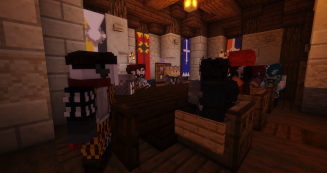
The Hadrian Empire was established in the year 1524 under the guidance of the first Emperor, Matthias Joseph I of House Withmond after the collapse of the kingdom of Veronia. The Hadrian Empire thanks its name due to it being the nation that unified the fractured human realm left behind in the wake of the second Hadrian civil war. The first Hinterlander republic was absorbed first after it collapsed in on itself, and the Nordic realm of Królestwo Ràdymie followed shortly after. Shortly after Matthias united the loose kingdoms he was officially crowned Emperor by the Vater of the Alderist Church, Vater Ferdinand. A golden crown decorated with two great stallions inherited from his relative and last Hadrian King, Roderick Withmond, was placed on his head. The new Emperor was gifted an ivory staff inscribed with the crests of all the great houses through which his rule was cemented.
The rule of Matthias was one of peace and growing unity within the new empire. Though this upcoming new age for the empire would be brutally disrupted after only three hundred days as one day, Matthias opened his eyes and found himself terribly weakened without any clear explanation as to why and was swiftly bedridden. The only one allowed by the Emperor’s side during these days was a young prince and ward from the old von Lichtenfelts dynasty, Philipp. The people of the Empire prayed to Alder and Mortius to spare the young Emperor yet behind closed doors, Matthias’ condition only worsened, eventually making it clear to all around him that the new young Emperor would die childless and incredibly soon. It was only when Matthias himself realized this that he turned to Philipp and according to Philipp named him heir of the Hadrian Empire. Matthias would die peacefully two nights later. He was buried after a week of mourning in the Grand Cathedral of Alder in Adelsburg. His body remains in the Adelsburg crypts to this day.
Restoration of the Von Lichtenfelts Dynasty & the First Luminion Crisis (1525 - 1526 AFS)
Shortly after Matthias died and was buried the self-proclaimed heir to the throne, Philipp Wilhelm von Lichtenfelts, ascend with the help of the army he was the commander of through his position that was equivalent to the modern Reichsmarshall. Though his claim based on Matthias’ last words can easily be questioned, his bloodline’s claim is one that cannot, for it was House von Lichtenfelts that was overthrown by House Withmond during the first Hadrian Civil War. It was through this claim that he met very little resistance when taking the throne for it felt more like a restoration than a coup or hostile take-over. Though his ascend did not go entirely without trouble. As Philipp took the throne he was quickly informed of rising tensions in the east as Lord Arnoud van Leuveren of Wakkerdam called the wrath of the High Elves of Luminion upon himself by insulting and threatening the crown princess, Cirlia Zaithrall, and disrespecting the royal family as a whole during a meeting in an attempt to resolve the matter. The Elves claimed that Arnoud lost his patience during that meeting and threw a chair through the meeting room, destroying it in the process.
The Elves threatened with war if justice was not served and upon this threat, Arnoud requested that the Emperor mustered his forces to face the Elves on the field of battle. The Elven armies rallied to Luminion, patiently awaiting the Emperor’s response to the chaos. The forces of the Hinterlander duchy of Wakkerdam did the same, resulting in a standoff between the two sides that would result in an all-out war if the Emperor would not intervene, and intervene he would. Kaiser Philipp openly denounced the actions of Arnoud in an effort to ease tensions and ordered Arnoud’s arrest to have him stand trial in the capital to find out if the Elven claims were true. When this grim news reached Arnoud through his spies, instead of facing the Imperial High Court, he decided to not become an Elven martyr through that trial and he fled to the court of Sultan Sig’vyl Al-Buthara in the Empire of Anjyarr where he was accepted with open arm by the Dark Elves who ruled those lands. The Sultan, a former ally of the Hadrian nations since the rule of Roderick Withmond, seemingly out of nowhere accepting political refugees was seen as a betrayal by the Emperor and relations quickly soured while relations with Luminion increased, the Therri’cill, Aldir’tor Zaithrall ordered the forces to stand down and a meeting was organized between the parties to resolve the issue. During this meeting between the leaders, Kaiser Philipp swore to find and capture the now-branded traitor, Arnoud, and bring him to justice for attempting to provoke conflict between the empire and Luminion.
Lord Arnoud remained in exile for the remainder of 1525, hiding from agents sent by Kaiser Philipp to retrieve him and take him back to Adelsburg and attempting to block any attempt by the empire to retrieve him through diplomatic means with Anjyarr. Arnoud was surprisingly effective within the Anjyarri court as his friendship with the Sultan grew quickly throughout his exile, though the entire ordeal had a rough mental toll on Arnoud who was now cut off from his home, family, friends, and people started to feel terribly homesick, tired of the constant game of cat and mouse between him and the Hadrian government. This prompted him to send a missive to the Hadrian Empire requesting safe passage into the empire and to the capital where he would stand trial in exchange for the promise that Philipp would spare his life. The Emperor swiftly accepted this offer and protected by an Anjyarr escort led by the sultan himself did Arnoud make his way to the capital through the passage of Al-Jabrid and Ceril’s Keep. As he arrived he was swiftly arrested by the Emperor’s men and brought to the courthouse to await his trial. The sultan who wished to be present at the trial was denied entry into the courthouse, enraging him and his troops. After continuous efforts by the Sultan to negotiate his way inside he lost his temper and Sig’vyl who was also a Pyromancer shot a fireball at the courthouse, burning part of the entrance before he ordered his men to stand down and make camp outside the city.
Arnoud's Trial
Arnoud’s trial was led by Lady Judicar Ma Belov and was attended by Emperor Philipp and his retinue personally. Arnoud denied any legal aid offered by the Hadrian state, instead choosing to lead his defense himself. Arnoud held a long speech in which he ridiculed the treatment of Hadrian nobles, the weak response to the Elves, and how he believed him standing trial proved that the Hadrian Empire has devolved into little more than Elven puppets. Sadly for him, his words fell on deaf ears and Ma Belov who was said to have a personal grudge against Arnoud quickly found him guilty of treason, evading trial, and inciting a war between the Hadrian Empire and Luminion, and against Philipp’s promise, he was sentenced to death by hanging. The moment this sentence was spoken, guards emerged from behind Arnoud and quickly restrained him. Arnoud was quickly dragged from the courtroom as he screamed for Philipp to stop this madness and allow him to live, though his pleas remained unheard and the Emperor sat by as he was taken away. The guards took Arnoud to the eastern gate, opposite of where the Anjyarri escort was camped, and quickly carried out his sentence, hanging him by the neck just outside the city walls. Royal knight Cedric Reinhardt decapitated the corpse shortly after Arnoud was assumed dead, though it was unclear if the noose or Cedric’s blade ended Lord Arnoud. The last words uttered by the lord were recorded as being “Alicia..” followed by Emperor Philipp stating “Maker guide du, sweet fool.” before returning to the palace, leaving Arnoud’s headless body by the side of the road for all to see.
An Empire Forged Through Blood (1526 - 1528 AFS)
After peaceful relations were restored with the High Elves of Luminion and Arnoud’s death, an era of peace seemed to be on the horizon for the Attians for the first time since the civil war ended. There were no direct threats on the borders, trade was flourishing, and the voidal powers were kept at bay or destroyed wherever found. The new Kaiser, Philipp, cemented his power throughout the realm and pacified Arnoud’s last few supporters around Wakkerdam. As the year 1526 came to a close, the Kaiser married the commoner Anzhelika Rozhdestvenskij after meeting her at one of his Kaiser’s Courts, having children shortly after, and the Imperial Duma was established to involve imperial citizens more in the ruling of the Empire. Under Philipp, Hadriana no longer solely relied on a government only made up of Imperial Nobles and Clergymen, but the citizens of the Empire were both workers and rulers besides the nobility and clergy. Naturally, this sparked some unrest within the upper class of Hadrian society, yet it was nothing worth addressing yet. Philipp and his newly formed Alderian Council, a body of imperial advisors to the crown, relentlessly continued on the path of tightening the grip on the Empire, devoting themselves to ending the feudalistic society the Empire has been in and transforming it into a modern nation-state such as many of their neighbors. Since Matthias formally achieved unification in 1524, many of the provinces of the empire were still mostly ruled locally or influenced by bishops of both the Makerist and Alderist temples through Vater Factorius. Philipp ensured the Duma got more power on a national level and disbanded the Holy Legion of the Alderist Church, while simultaneously reducing the civil rights of Makerists to besides national unification, also promote religious unification through these reforms. Those who opposed these reforms were swiftly dealt with through either banishment or the sword. The refugee waves coming from banished citizens, mostly Makerist Hinterlanders, greatly aided Arnoud’s nephew, Silas, to form a second independent Hinterlander Republic in the northern reaches of Eden to oppose the empire which would formally become a recognized authority in 1529.
Leod's Betrayal
The first real challenge to Philipp’s rule came in the form of a thrust from within, as the general of the Hadrian armed forces, Leod Iomharach, turned out to have an affair with the Hadrian Empress, Anzhelika. After the two shared an intimate night, the empress felt incredible remorse and confessed what had happened to Emperor Philipp. The Kaiser was enraged by this news and immediately summoned Leod to the Imperial Palace for questioning under the guise of a simple meeting regarding defensive matters. General Leod came to the palace as he had done many times before for he was considered a friend of the Imperial Family and of Emperor Philipp in particular. As Leod entered, he was led to the eastern balcony where Philipp after briefly playing as if they had a simple meeting and confronted Leod with the matter at hand. Leod attempted to deny any claims of having slept with the empress and simply expressed they were good friends. These words fell on deaf ears and Philipp had tremendous trouble controlling his anger towards his former best friend. Leod noticed that things were swiftly moving south and he decided to act first, in an act of impulse, he drew his sword on the Emperor and challenged him to single combat to resolve the matter. Philipp replied by drawing his own sword and the two were quickly clashing their swords on this balcony. The two friends both had lots of military experience, yet Leod was the better swordsman and as the fight went on, Philipp started to tire, leaving openings in his defense that were exploited by Leod, he slashed Philipp across the face, hitting his right eye and hacked him in the leg, rendering it useless. As the Emperor collapsed, the imperial guard led by Lady Judicar Ma Belov who heard the struggle outside finally broke down the door to the balcony that Philipp locked and saw the onslaught caused by the struggle. The entire balcony lay covered in blood and the Emperor sat blooded and beaten in the corner, yet still having his sword raised in defense against Leod. Ma and the Imperial Guards swiftly came to Philipp’s defense and cut down Leod, not killing him, but leaving him to die after a slash to the throat that made him collapse. This slash was delivered by Ma, who Leod refused to fight due to their personal relations. Ma though did not hesitate to put the man down, and as a single tear rolled down his cheek, Leod was beaten.
Philipp was swiftly taken care of by imperial medics who were able to save his life, though at great cost. The Emperor was now without a leg and missing an eye, crippled and weakened for the remainder of his life. This had a heavy mental toll on the Emperor for not only was the always agile Emperor now chairbound and missing his half his eyesight, he was also betrayed by those closest to him, his best friend and his wife. Most of the ambitious projects that the empire was working on came to almost a complete standstill as without the Emperor’s guidance and direct involvement, it was incredibly difficult to get the nobility and clergy to live by the new reforms. Leod never truly faced justice for his crimes as he was abandoned after being cut down. Yet, he was not mortally wounded and when he saw the opportunity, he lunged off the low-hanging balcony and fled Adelsburg, never to be seen again besides rumors of him having settled down in Anjyarr like many traitors of the Hadrian Crown before him.
The Second Luminion Crisis (1528 - 1529 AFS)
The years directly following Leod’s betrayal were relatively quiet by Imperial standards. The Kaiser was slowly but surely recovering from his trauma and the empire as a whole kept on moving steadily for there were no real threats to disturb it. The one noteworthy event of early 1528 was the coup attempt by Herzog Janczyck-Mariusz Tzyrnowski who deemed the Emperor weak in his current state and wanted to take his place, though sadly for him he had no support so his plan quickly fell apart and he asked for an imperial pardon for his actions against the crown, which was granted by Philipp. This relative peace was occasionally disturbed by the rise of the so-called Lord of Bones, a voidal entity that was sending his emissary, Mordazan around the human states, seeking support for his cause of rebuilding the bridge of souls to allow passage for the dead onto the afterlife once more. A cause the imperials did not trust at all, they rejected the creature and dug in against some minor undead incursions after.
Cedric's Expedition
It was only when Eden’s Shine came around that the peace was roughly disturbed again. This time the knight and professor Cedric Reinhardt, who was of the Imperial College wished to organize an excursion to the Glade of Dragons to seek out magical creatures and study them. A request was sent out to the Enlightened Kingdom of Luminion to enter with the study group, this request was granted on the condition that the humans only went into the wilderness with Elven guides with them to ensure their and the local wildlife’s safety. As the two sides were attempting to arrange a date on which the excursion was to take place, Cedric ran out of patience and organized a second secret excursion by himself. Cedric alongside a class of students crossed the eastern border in secret and traveled to the glade, avoiding any High Elven patrols or border guards as best he could. Eventually, his party found itself in the vast magical forests just south of the Elven capital city of Luminion. The party prowled the forests for a few days, marveling at the creatures, structures, and beauty in the region. The mission seemed to be a success until on the way back to the border, the party ran into an ominous-looking ritual site just south of the city of Luminion. Against better instincts, Cedric wished to investigate this site and found a mysterious necromantic artifact. Upon closer inspection, it seemed like a magically charged item, and Cedric tried using it to see if it did anything. This naive mindset quickly resulted in disaster as the artifact suddenly awoke and possessed one in the party, this person started chanting voidal gibberish that awoke those buried underneath the ritual site. Skeletons and specters arose from the depths of the soil and relentlessly attacked the party. The lightly armed group stood no chance against this onslaught and many were slain and wounded. This went on until the group somehow managed to disarm the voidal artifact, making the undead crumble back into the ground once more. The battered remnants of the party quickly collected their wounded and made way for Luminion City in the hope that the Elven medics would be able to save their wounded.
The Elves did everything in their might to save as many people as they could while the Therri’cill, Aldir’tor Zaithrall was summoned to assess the situation and figure out what led to this disaster. When asked, Cedric claimed they were ambushed by a voidal creature on the road as they traveled, and when asked what triggered the attack itself, Cedric claimed innocence and that nothing, in particular, seemed to have attracted any voidal activity. Cedric’s party was sent on their way home after a few days of recovery while the most severely wounded stayed behind for further treatment. The party received a signed letter from the Therri’cill requesting an audience with Kaiser Philipp to discuss a proper punishment for the trespasses of the Imperial students. When the meeting was eventually held in Adelsburg, Philipp accidentally told the Therri’cill about the voidal artifact that Cedric instead of leaving behind, decided to hide and take with him back to Adelsburg. Aldir’tor was furious at this remark as he was lied to by Cedric and claimed that withholding crucial information like this severely endangered the Enlightened Kingdom. Philipp too was baffled for Cedric told him that the Therri’cill was made aware of the whole incident, including the fact that it was triggered when investigating a necromantic artifact. As this lie was uncovered it was swiftly decided that Cedric deserved severe punishment, the Therri’cill demanded death, yet Philipp was unwilling to execute one of his knights for in his eyes a minor incident and ordered him to be whipped fifty times instead. The punishment was carried out before the dissatisfied Therri’cill’s eyes and he went home swearing he would serve justice in his own way for no one lies and endangers the Enlightened Kingdom and gets away with it.
The High Elves swiftly took action after this as they hired a group of mercenary orcs to abduct Cedric and return him to Luminion to stand trial in the Elven court. It then did not take long before Cedric was ruthlessly taken from a feast in Norbüren and taken to the Orcish holdout of Zadh-Nadrozz. It was here where the nature of the abduction was revealed as when Cedric was brought forth to be tortured, he found an elven party led by Aldir’tor himself present to collect him after the faulskins were done with him. The chieftain of the hold, Gaerth, took Cedric’s hand as a trophy after degrading and torturing him for a while and then handed him over to the Elves who swiftly rode him to Luminion, patched him up, and brought him before the citizen council to stand trial publicly for his transgressions. The elves, demanding justice to be served ordered that Cedric’s eyes are to be ripped out before being sent back to Adelsburg as a warning. A horrific fate, yet he could call himself lucky as the elf in charge of carrying out his sentence outside the city felt pity for the already severely wounded Cedric and only took a singular eye before releasing him back into the empire.
On the Brink of War
When Cedric was found and brought before the Emperor, he was horrified at the sight and almost couldn’t fathom how this could be the so-called divine justice the Therri’cill was looking for. Cedric’s wounds were festering and would start to infect during his recovery, making him lose half his face and develop a terrible condition known as leprosy as a result. The Emperor was enraged by the sight and sent an ultimatum to the Enlightened Kingdom, demanding they repay the damage done, or face war so the empire will serve justice itself. This ultimatum was met with the usual pompous derogatory speech that was to be expected from the High Elves of Luminion and after this brief exchange, war seemed inevitable. Both sides started mustering their forces and the occasional skirmishes at the border were reported swiftly after. A company of knights who crossed into Luminion were captured and high elven border patrols were snatched off the road by imperial ambushes and put into captivity. While this was going on, Emperor Philipp had drafted the war declaration on the High Elves and was about to send a bird to deliver the formal declaration as the conflict was abruptly halted by the sudden rise of the armies of the Lord of Bones to their south. This new and far more dangerous foe that appeared all over their lands out of nowhere turned the two rallied armies into uneasy allies for the time being. The two sides managed to put aside their differences and eventually, the situation calmed as the need for a unified mortal stand against the rising forces of the undead greatly overshadowed the need to fight for the pride against one another. The unified war against the undead scourge came to a head towards the end of 1529 when the forces of life led by Emperor Philipp and A’mos Zaithrall of Luminion clashed with the undead armies of Mordazan in the battle of the black obelisk where they after a long and grueling battle failed to stop the summoning of this so-called Lord of Bones to the mortal plain. A defeat that would haunt them for years to come.
Another thing that would haunt the empire for years to come was the establishment of the new Hinterlander Republic of Raevendrecht in the north. A process that was sped up immensely as during the tension of 1528 and 1529, the High Elves allied themselves with the scattered Hintish forces led by Silas Moetiour- van Leuveren, aiding them to establish the new republic to make a stand against the Empire.
The Hadrian-Raevendrecht War (1530 - 1532 AFS)
After a shaky peace was established with the Elves after the battle of the Black Obelisk, Emperor Philipp turned his attention northwards to the newly established Hinterlander Republic. Raevendrecht branded itself as a free state where every man was a king and equal rights for everyone is kept in high regard. A pathetic structure from an Imperial perspective. Emperor Philipp devised a plan with his council to absorb the hinterlanders back into the empire as they had done many times before and through that realize the vision of rebuilding in his words “Großhadriana”. An empire stretching from the sandy borders of Anjyarr in the south to the icy gates of Dar-ach Denur in the north. All that stood in the way of this vision was the new Hintish Republic. Philipp’s government led by the new head of the Imperial Duma, Sine Verrador, a refugee from the republic, presented a plan to realize the imperial vision of the Emperor and send an ultimatum, demanding the Hinterlanders to rejoin the empire, to the Stadtholder’s office. The proposal was presented at the perfect moment for only weeks before, the northern border bridge had allegedly been attacked and vandalized by the Republic’s forces, enraging the public and local nobility. The proposal of forced annexation was one many voted in favor of in a day and age where nationalism was a strong factor as a result of Philipp’s early reforms. And so it was done, the ultimatum was sent out the next week.
A reply followed quickly in which the Hinterlanders, as expected, rejected the ultimatum. This prompted the Hadrian government to send a second ultimatum, asking them to either reconsider the offer presented or face conquest. While this diplomatic back and forth was going on, Emperor Philipp employed the aid of a feared mercenary company known as the Order of Lazarus hailing from Castle Helstein. They were to act as the fist of the Imperial armed forces against the Republic’s defenses. The second ultimatum was turned down as well and when that final republican reply reached the imperial court, both sides prepared for war. The Hadrian government officially declared war on Saintsday the 1st of Firstseed, 1532.
The raid of Raevendrecht (Moonday 30, Highbloom, 1532)
The first strike of the war followed soon as the “fists” of the war, the Helstein company aided by troops from the Imperial Army under the command of Siegfried od Albion opened a surprise assault on the Republic’s capital, Raevendrecht, on the 30th of Highbloom, 1532. The attackers had been lurking in the forest around the capital for some time, patiently awaiting the perfect moment to strike. This moment presented itself at nightfall on the 30th when most sentries returned to their barracks, leaving the western gate completely undefended. A war horn was blown as the troops poured from the forests beside the gate, overwhelming the few active troops sent to defend the gate. When the Hadrians poured into the capital proper, Stadtholder Silas ordered a retreat to the city castle in the hope to make a stand against the attackers there. Many lone soldiers were stranded outside the closed castle gates as the attackers relentlessly cut their way through the city. When the Hadrian force eventually reached the castle gates, they contemplated if it was possible to attack the castle to achieve their goal of capturing the Stadtholder. After counting their troops, Commander Siegfried came to the conclusion that an assault is in fact possible and should be attempted. And so it was done, the forces of the Hadrian Army attacked Silas’ castle in the heart of Raevendrecht and managed to breach it by lockpicking through the side doors of the main castle gate which were not locked properly.
The castle was breached and the once quiet halls of the Stadtholder's personal headquarters were now filled with the sound of clashing swords and the screams of men, slain by the swords of the Hadrian Army. The castle was occupied shortly after. The raiders now searched in any nook and cranny of the castle in search of the Stadtholder. They had little time to complete this mission as the uncle of Silas, Johann, was outside in the city, rallying the Raevendrecht garrison properly and prepared to assault the castle to retake it and capture the Hadrian military command. Siegfried’s company eventually reached the highest tower of the castle where behind a locked door, Silas was hiding. When the Stadtholder knew he was found, he opened the door and made a valiant last stand against Siegfried and his two guards, killing one and wounding Siegfried before being taken out and captured. Silas was put in iron cuffs and quickly smuggled out of the city alongside the remainder of the raiders, they escaped Johann’s main force just in time as they swiftly rode back to Adelsburg carrying their prize.
A stadtholder in chains
Back in Adelsburg, Silas faced Emperor Philipp as he was once again offered to surrender and join the greater empire as its vassal, Silas refused and was tortured for a week, losing an ear and a finger in the process before being sent home by orders of Emperor Philipp. Why this was done is not particularly clear, but the general consensus is that it was an act of generosity and a way to induce fear when the Republicans saw their leader come home, beaten and battered like that. This sudden release greatly annoyed Lord-Commander Siegfried for Silas’ release felt as if all his work and the blood he spilled to achieve his goals were for nothing.
Der Fluss Landing (Marketday 6, Greenfall, 1532)
After the release of Silas, both sides knew that the next major engagement would decide the fate of this war. The Republic’s army crossed into Flussland and besieged lord Janczyck’s castle Lunburg, while the Hadrian army made a landing on the northern side of the river. When news of the siege of Lunburg castle reached the Hadrian army command, a choice was made that before marching for the capital city of Raevendrecht once more, they should first turn back and rid their lands of the Republic’s army whose way to Adelsburg would be open if they managed to take castle Lunburg. The long march back south came to an end at the river Veine’s shores as on the other side, the banners of the Republic’s army dominated the field. The entire province had by this time been occupied and the last Hadrian holdout remained in Castle Lunburg itself.
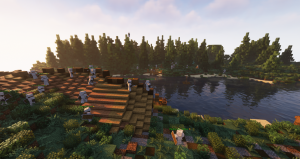
A long stalemate ensued, only broken when the Lazarus mercenary company under the command of Mordrael Morosov convinced the Hadrian command to conduct a landing operation. The Hadrian army managed to land on the southern shores of the Veine just outside Castle Lunburg. The Republic’s cavalry who prowled the area declined to engage the landing force for they were extremely outnumbered and decided to retreat to the main fighting force, making the Hadrian landing go completely unopposed. Proper fighting started in the thick vegetation of the Flussland hills outside the castle. The Hadrian infantry was briefly surprised as the enemy levymen soared over the hill and engaged the Hadrian army frontally. The Hadrians were forced to retreat after suffering heavy losses until a counterattack was ordered after the army managed to rally itself. This counterattack managed to capitalize on the Republic’s army overstretching itself after its initial victory, isolating small pockets of Raevendrecht’s troops from the main force and eliminating them. Through this tactic, the Republic’s army started to disintegrate quickly. The remnants of the Republic’s army, after losing its capability to fight the Hadrians directly, engaged in hit-and-run attacks for a few more hours before a retreat was called by the republic’s central military command.
The day ended in a decisive Hadrian victory, paving the way for the siege of Raevendrecht and the end of the Republic.
Sine Verrador’s Betrayal (1532 AFS)
The war was an astonishing success in the eyes of the Hadrian Empire, Emperor Philipp’s vision of a greater Hadriana would soon be realized. To celebrate the victory in Flüssland, the Emperor organized a medal ceremony to honor those who fought in the battle and led the Hadrian army to victory. The ceremony was to be held in the Imperial Palace of Adelsburg. Both Hadrian officials and Helstein’s men were invited to take part in the celebration and ponder over the world that was to come after the war. Though in reality, the fate of both the war and Hadriana as a whole took a terrifying turn during this event.
Not long before the celebration, Siegfried od Albion, Lord-Commander of the Hadrian army, and Sine Verrader, Head of the Imperial Duma, met with the leadership of Helstein’s order, convincing them that the Emperor was low on Andros and ordered the two to not pay the mercenaries for their hard work on the battlefield. A promise was made that if the mercenaries assisted the two in overtaking the reigns of the Empire, they would pay them double for their efforts, an offer the order gladly agreed to. In reality, both Sine and Siegfried had been conspiring to take the throne ever since the Emperor allowed Silas to walk free after his capture, resulting in many more lives lost for in their eyes nothing but personal glory for Philipp. They wished to rid themselves of Philipp, whose health had been declining for some time as both his old wounds and ever-increasing age started to catch up with him, crown-prince Karl, who they deemed weak and unfit to rule the empire, and the remainder of the living royal family, and so it was settled. The mercenaries and Imperial Army positioned themselves in the throne room where the ceremony was to be held and after Sine’s opening speech, all involved drew their swords. Sine was the first to strike and with a single thrust into Philipp’s chest, his life was ended. In his last moment, a singular tear rolled down his cheek as he realized that he was once again betrayed by his closest friends and allies, yet this time, the only way out was death. Crown Prince Karl, frightened by the sudden chaos, drew his sword in defense, this was then used to justify an attack against him. Siegfried approached the young prince from behind and with a singular blow to the neck, separated his head from his shoulders, leaving him dead as well.

The last man standing after the imperial guard was cut down was Ser Wyatt, a close friend and ally of the throne. While the imperial family and guard were cut down, he lunged himself at the traitors, cutting down eight of them before being overpowered and slain. The traitors moved quickly after they murdered everyone in the room and captured any loyalist noble and knight present in Adelsburg. Helstein’s armies rode out to the estates of said loyal nobles and knights and occupied their holdings. Most of the Imperial provinces were swiftly brought under Sine’s control, yet his search for the remaining Lichtenfelts was far from successful. While he managed to place Empress Anzhelika under house arrest in the imperial palace, the remaining three children were smuggled out of the city by loyalists, Helena and Hugo were brought to Luminion, while Katherina was smuggled into the Republic of Raevendrecht. Meanwhile, Philipp’s brother, Diederick-Gobel, was stationed in Castle Lunburg together with Lord Janczyck-Mariusz Tzyrnowski and did not attend the ceremony. When news reached them of what happened, Janczyck cursed at the usurper’s envoy who came to demand Janczyck’s loyalty and Diederick’s delivery to the capital. In response to the chaos, the last bastion of the loyalist faction split off from Hadriana, standing defiant against Sine’s new imperium.
The Rise of the Electoral Imperium of Hadriana (1533 AFS)
As the imperial provinces were being consolidated by Sine’s usurper armies, they sent a Helstein company to besiege Castle Lunburg to force them into submission. Though they greatly underestimated the strength of the northern bastion. Any attack launched at the castle did not even manage to breach even the outer walls. The frustration of failure combined with pressure from a reforming Republic’s army that was rumored to have aligned with Janczyck's remaining forces eventually forced the traitor legions to retreat from the province. Sine quickly opened peace negotiations with the Republic and now that he had pretty much lost his entire dominant negotiation position through this action and instead of a grand conquest, the empire was forced to give up the rebellious province and accept a meagre white peace besides that. The imperial province officially joined the republic officially shortly after the Peace of Luminion was signed.
The months following this peace were relatively quiet, yet very stressful for the new so-called Supreme Chancellor of Hadriana. Many of the populous and the established nobility and clergy did not support his rule so most of the year 1533 was spent ridding the empire of every relevant person who had any sort of criticism towards the regime. Even the Vater of the Alderist temple was replaced with who would be known as the false shepherd after he was driven out.
Another subject plaguing the Imperium is the complete lack of any foreign relations due to them going unrecognized by anyone. The Enlightened Kingdom of Luminion against everyone’s expectations refused to recognize the rule of Sine and saw Diederick or Hugo as the rightful ruler of the empire. This may naturally be fueled by the fact they held two of Philip’s children in Luminion. This blockade on the international playing field placed the Imperium practically in isolation together with the Helstein mercenary company, whose only employer from that point on would be Sine and the Hadrian usurper government.
The Rise of Diederick and the Restoration of The Hadrian Empire (1534 - 1535 AFS)
While Sine’s government was struggling to settle itself as a legitimate political body on the content, an army was gathering in the separated province of Flussland. Diederick-Gobel von Lichtenfelts unveiled himself and placed himself as a rallying point for any old loyalist to flow to. And throughout the year, many citizens, soldiers, clergymen, and exiled noble families rallied behind Diederick and joined his liberation front. This naturally did not go unnoticed and many of Sine’s agents attempted to infiltrate Diederick’s forces to sabotage the cause, this had limited effect. Besides these infiltration missions, Helstein’s forces often patrolled the region and attacked isolated loyalists to widdle down Diederick’s numbers. This initially was a successful strategy, yet as more raids happened, the loyalist forces adapted and captured and executed more and more of Helstein’s mercenaries, drastically reducing the already dwindling numbers of Sine’s army even further.
The loyalist front was growing quickly, yet with that came an increasing difficulty to be allowed to remain within Lunburg. Not because lord Tzyrnowski was against the cause, but because housing “rebel groups” went directly against the treaty of Luminion and therefore could be used as a casus belli to attack the Republic who currently ruled over Lunburg. Diederick pulled on all political strings he could find within the republic in an attempt to extend his stay for as long as he could. This time was used to grow his loyalist group into a formidable army and when the time came to strike, a message was delivered by Cain Eldrick, one of Sine’s government officials who had flirted with the idea of defecting before, stating that Sine’s government and Helstein had abandoned Adelsburg in the wake of the invasion and vanished south, never to be seen again. Internal division and the lack of a standing army prompted Sine’s government to flee with all the wealth they could get their hands on and leave this broken empire behind.
Diederick would soon after reach Adelsburg and find only but a shadow of its former self. The streets were empty, stores plundered and ruined, the palace was in ruins and the Grand Cathedral of Alder stood defiled as its centerpiece. A lot of work had yet to be done, but with his newly acquired loyalists by Diederick’s side, there was hope for a bright future. Diederick’s first action would be to clean the streets of the capital in an effort he called “the great sweep” to return the capital to a somewhat decent state. Next, Diederick would appoint a handful of officials to start rebuilding the empire. The later months of 1534 were marked by great reform as the noble houses in exile were reinstated, and a functioning body of government in the form of the Imperial Diet was created. This Diet did somewhat return to a style of government akin to what Matthias created back in 1524, with the noble class ruling the empire together while the commoners were only involved in local politics. Diederick knew that this new empire was too big for a single council of nobles to rule, and therefore also undid many of Philipp’s national unity reforms and returned much autonomy to the provinces in return for a regular tribute to rebuild the treasury. Political channels were reopened with the surrounding states, including the newly established Kingdom of Eisarnknoth, another break-away imperial state created by Lady Aleksandra. The two swiftly formed an alliance and all seemed well in the empire for a little while. Yet this was ruthlessly disturbed by one of the last lurking members of Helstein’s mercenaries, Argyle, who attempted to assassinate the Emperor during a public feast to celebrate the liberation of the empire. Argyle ruthlessly hacked in on the Emperor but was unable to kill him. Diederick, through his many years in service on the frontier in the north, had become a powerful warrior and was not plagued by the handicaps his brother suffered from. As the guards and guests joined in and attacked Argyle from behind, Diederick took up his sword and fought the assassin head-on, eventually knocking him off his feet before plunging his sword through the man’s visor and skull, ending the last of Helstein’s rabble.
Diederick would be coronated at the dawn of 1535 and started a small-scale military campaign to occupy Castle Helstein, ending the last reminder of the usurpers and their reign of terror. It was truly the beginning of a new era, an era that has yet to be written.
| Nations | |
|---|---|
| Human Nations | The Hadrian Empire |
| Elvish Nations | Luminion · Mitrona · Anjyarr |
| Dwarvish Nations | The High Kingdom of Arduan |
| Orcish Nations | Zadh Nadrozz |
| Other Nations | |
